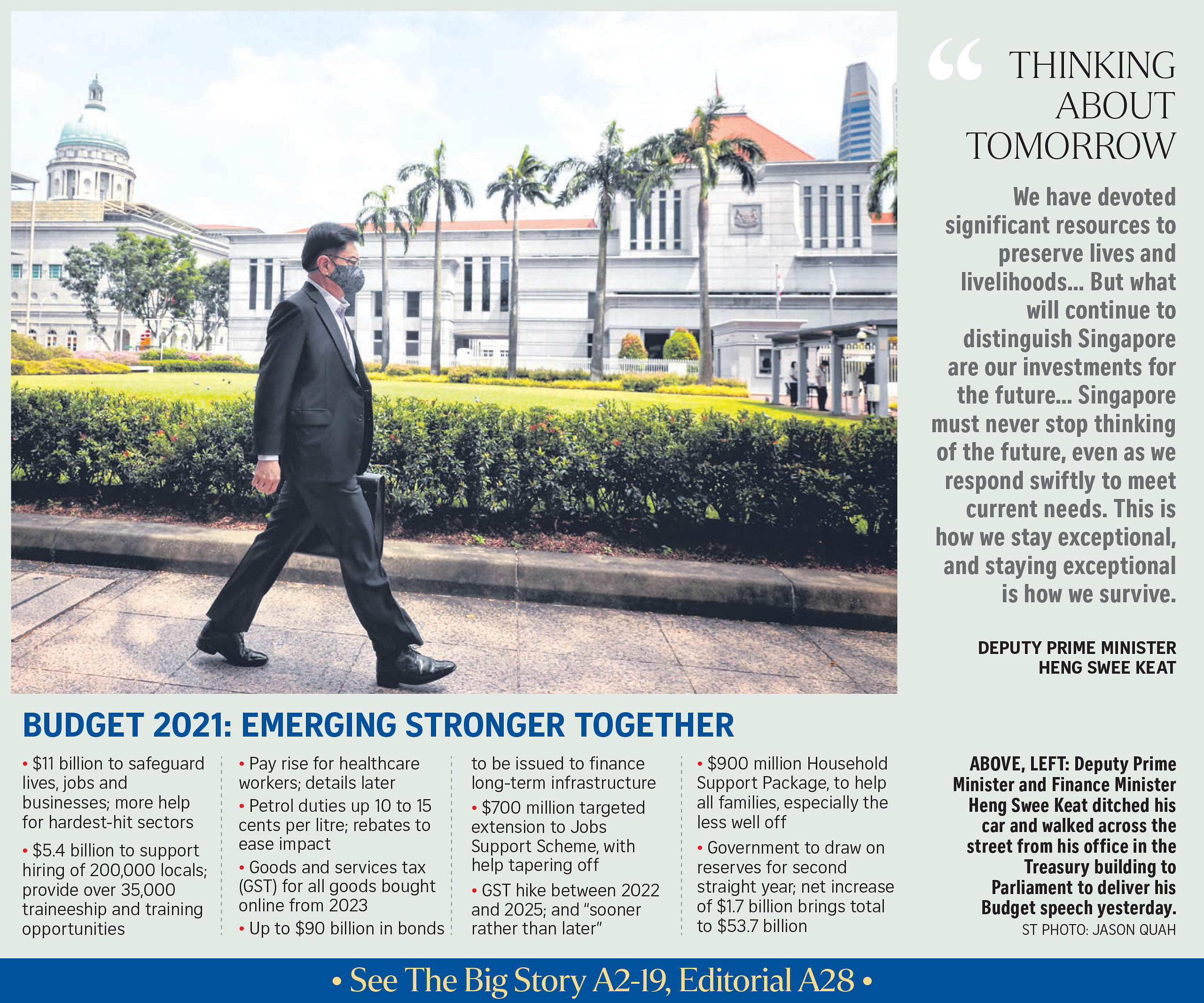Against a backdrop of global uncertainty amplified by the pandemic, Deputy Prime Minister Heng Swee Keat yesterday delivered a Budget finely balanced between providing immediate help to sectors under stress, and investing in Singapore's long-term future.
The $107 billion plan - the first full Budget in the Government's new term - includes an $11 billion Covid-19 Resilience Package. This will help safeguard public health and support the workers and businesses that need help, with extra money going to the hardest-hit sectors, such as aviation and tourism.
The Jobs Support Scheme, which helped stave off retrenchments last year, will be extended until September, but in a more targeted and tapering way. This will cost $700 million.
Job seekers also got a helping hand, with another $5.4 billion set aside for a fresh injection into the SGUnited Jobs and Skills Package. This is on top of the $3 billion set aside last year and will support the hiring of 200,000 locals through the Jobs Growth Incentive and provide up to 35,000 traineeship and training opportunities this year.
In addition, Mr Heng pledged to allocate $24 billion across the next three years to enable Singapore's firms and workers to emerge stronger from the crisis.
The country's investments to equip its people to seize opportunities and help businesses innovate are what distinguish it from others, said Mr Heng, who is also Finance Minister.
"While last year's Budgets were tilted towards emergency support in a broad-based way, this year's Budget will focus on accelerating structural adaptions," he added in a speech that lasted just over two hours and underscored the need to make the country's businesses and workers future-ready.
Mr Heng announced that the salaries of nurses and other healthcare workers, who have been on the forefront of the fight against Covid-19, will be enhanced, with details to be disclosed later.
He also unveiled a $900 million Household Support Package of utility grants and GST and cash vouchers to help all families, but targeted most at lower-to middle-income households.
And in line with Singapore's long-term goal to become a more sustainable society, measures will be introduced to encourage the adoption of electric vehicles, with green bonds to be issued on select public infrastructure projects.
In a Facebook post last evening, Prime Minister Lee Hsien Loong said: "While grappling with the pandemic, we must not neglect the future. Hence the Budget has many items that build our capabilities and competitiveness. When the sun shines again, we must be ready to seize the new opportunities."
All these measures mean that Singapore will see a Budget deficit of $11 billion, following last year's deficit of $64.9 billion.
Running a fiscal deficit to support targeted relief is warranted in the immediate term, given the unprecedented impact of Covid-19, Mr Heng said. But Singapore's recurrent spending needs in areas such as healthcare will continue to rise, and the country must meet these needs in a "disciplined and sustainable way", he said, adding that beyond this crisis, "we must return to running balanced budgets".
Singapore will tap its reserves to fund the $11 billion Covid-19 Resilience Package. But Mr Heng pointed out that the nation expects to utilise only $42.7 billion of past reserves for the last financial year, against the $52 billion that had been provided for.

This means the total expected draw over two years will amount to $53.7 billion - a net increase of $1.7 billion from what Singapore expected to draw from its reserves to respond to the crisis. President Halimah Yacob has given her in-principle support for the draw, he added.
Singapore's spending needs mean the impending GST hike, slated to take place some time between next year and 2025, will happen "sooner rather than later". Its exact timing will depend on Singapore's economic outlook, Mr Heng said, adding that the country will not be able to meet rising recurrent needs without the increase. He reiterated that $6 billion has already been set aside under last year's Budget to defray the impact of this tax hike on the majority of Singaporean households by at least five years.
Petrol duties have also been raised for the first time in six years, and take place with immediate effect, with road tax rebates in place to cushion the impact of this hike.
From January 2023, GST will also be extended to low-value goods to ensure a level playing field for local businesses to compete effectively.
In order to finance long-term infrastructure such as new MRT lines that will benefit both current and future generations, the Government will also issue up to $90 billion in new bonds under a law to be tabled later this year.
On the topic of foreign manpower, Mr Heng said foreigners with the right expertise are a welcome complement to Singaporeans in areas where the country is short on skills. But foreign worker quotas will be tightened in the manufacturing sector, where the local workforce has to deepen its skills.
"The way forward is neither to have few or no foreign workers, nor to have a big inflow," he said. "We have to accept what this little island can accommodate."
Singapore expects its revenues will be able to support projected expenditure from all proposed measures as the economy recovers.
But this assumes the global Covid-19 situation comes under control by next year, said Mr Heng. Otherwise, the Government will seek the President's consideration to again tap past reserves.
"We have carefully thought through the different scenarios. While we expect recovery in Singapore and globally, there is a wide cone of uncertainty," he added.
"Even if the economic and fiscal situation turns out to be worse than expected, we must still press on to invest in new areas, so as to ride on the structural changes, transform and emerge stronger as an economy, and as a people."

